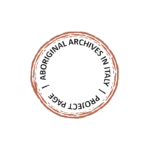Methodology and Values
Background
The influential concept of Henrietta Fourmile (1988) of ‘Indigenous peoples as ‘captives of the archives‘ has led to a field of scholarship by academics, activists and community members from across the world. Aboriginal Archives in Italy was inspired by the many First Nations scholars and activists who have exposed the vital importance of the Right to Know and the Right to Reply to their historical archives to achieve concrete social justice.
Within this larger context, the idea of the development of a Prototype for Aboriginal archival collections held in Italy was born with two main contributions in mind. The first is to reflect on a re-usable model to support Indigenous rights in records internationally. The second is to provide a specific example of a collaborative space between Italian institutions and Aboriginal professionals and Community members. By adopting a platform specially designed for the respectful access and management of Indigenous content, this research project wants to open up a transnational space of dialogue where Aboriginal voices and aspirations are centred.
Values
This study is grounded in the values of Relational Accountability, Reciprocity and Respect, and in recognition of the importance of deep listening and learning. Everyone engaging with this project will be required to account for the following values:
- Relational Accountability = committing to learning and deep listening and honouring a relational process based on mutual trust, cooperation, and transparency about the process and the outcomes.
- Reciprocity = committing to give back knowledge and provide a safe space for response and storytelling where all voices are valued.
- Respect = committing to support Aboriginal sovereignty and international awareness of Aboriginal rights in displaced records and the vibrancy and strength of Aboriginal and Torres Strait Islander cultures.
Process
The work for this project starts through conversation and consultation with Aboriginal and Torres Strait Islander professionals working in the library and archives sector, Italian institutions, and European researchers. In collaboration with the Italian partner institutions, I search and collate archival records and other materials related to Aboriginal and Torres Strait Islander peoples held in their archives. I then upload the documents in the digital archive prototype and translate (from Italian to English) information and resources that can be useful to locate the peoples and places represented in the collection. Attempting to identify and contact the peoples who could be connected to these archives is the next step. What happens next is completely up to the peoples involved in this relationship.
Technology
To create the digital archive, I adopted a platform specially designed for the respectful access and management of Indigenous content, Mukurtu [MOOK-oo-too]. I use Mukurtu to make accessible the archival records according to the appropriate cultural protocols, that will be established through consultation. Mukurtu is an open-source content management system built with Indigenous communities worldwide to manage and share digital cultural heritage, managed by the Centre for Digital Curation at Washington State University, USA.
I have chosen Mukurtu as a grassroots initiative to empower communities to manage, share, and exchange their digital heritage in culturally relevant and ethically-minded way. Mukurtu consults with communities and organisations to identify new features, improvements and to provide feedback on both long and short term development.

